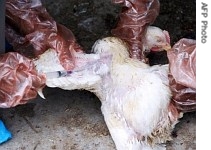-
(单词翻译:双击或拖选)
Dakar
18 August 2007
The West African country of Togo recently announced more bird flu infections outside its capital, making it the seventh West African country to report finding the deadly H5N1 virus in its poultry1. Bird flu experts say sub-Saharan Africa still has a long way to go in its battle against the virus, and any other animal diseases that may develop. Phuong Tran has more from VOA's West Africa Bureau in Dakar.
 |
| Indian health officials from the animal husbandry department of Kolkata collect blood samples from a dead hen, 8 May 2007 (file photo) |
The H5N1 virus re-emerged in poultry in Asia four years ago, and has since been reported to 60 countries around the world, killing2 more than 200 million poultry and more than half of the some 300 people infected.
Experts praised Togo's fast detection of the virus, but Togolese officials say getting people to listen has been hard.
Alex Thiermann, a director at the Paris-based World Organization for Animal Health, says people who raise animals in sub-Saharan Africa tend to be among the poorest, which makes it hard to convince them to kill their livelihood3.
"It is very difficult to explain to them that we need to destroy birds because we worry about a potential pandemic," he said. "They do not have time to worry about the potential. They have so many problems to fight on a daily basis so unless there is a good incentive4 program where there is an assurance they will not lose anything by reporting, then it is hard to guarantee full participation5."
| Fowl vendors wait for buyers in a fowl market in Lagos, Nigeria, 06 February 2007 |
Olga Jonas, the World Bank's economic advisor10 for influenza11 programs who coordinates12 bird flu donor8 giving, says local officials need to identify poultry farmers and inventory13 their stock to prevent corruption14.
"When there is an outbreak, you do not get into a lot of discussion about whether somebody did or did not have the poultry they are now claiming compensation for," she said.
But she admits it is hard to track small producers who live in remote areas. Noncommercial family-owned poultry farming is common in West Africa, where people often live in close contact with their birds
A second strategy to contain bird flu has been to improve animal health services.
Thiermann with the animal health organization says poor veterinary services in West Africa cripple the region's ability to control diseases that can spread rapidly.
"We are certain we are going to have a pandemic in the near future, but we do not know yet where it will begin and what that agent will be," he added. "We put so much emphasis on not only fighting the immediate15 problem, but also in building the infrastructure16 to allow these countries to early report and take rapid action, otherwise the entire world is going to be in danger."
The animal doctor says most diseases that have quickly spread throughout history originated in animals.
Animals are suspected of starting the spread of three major flu outbreaks in the 20th century that killed tens of millions of people.
However, not all potential donors are convinced of the threat that the virus can spread from one person to the next. So far, the virus has spread among animals and on a limited basis, from animals to people.
At a bird flu donor meeting this past September, the World Bank asked countries to raise an additional $1.5 billion.
The response was one-third that amount, and most of the money pledged was from the United States, Japan and European Union.
World Bank economic advisor Jonas is preparing another appeal for the next bird flu donor conference this December.
"The cost of a human epidemic17 would just be absolutely staggering, trillions of dollars," she noted18. "So relative to the cost that we are trying to avoid by these preventative programs and control programs at the source, the two-point-three billion that has been committed so far is just a very small fraction."
This year in West Africa, the H5N1 virus has been detected in Nigeria, Ghana, Ivory Coast, Burkina Faso, Niger and Togo.
Donors have promised sub-Saharan Africa $95 million for bird flu programs, of which $50 million is for Nigeria, which has reported one human death from bird flu.
 收听单词发音
收听单词发音
1
poultry

|
|
| n.家禽,禽肉 | |
参考例句: |
|
|
|
2
killing

|
|
| n.巨额利润;突然赚大钱,发大财 | |
参考例句: |
|
|
|
3
livelihood

|
|
| n.生计,谋生之道 | |
参考例句: |
|
|
|
4
incentive

|
|
| n.刺激;动力;鼓励;诱因;动机 | |
参考例句: |
|
|
|
5
participation

|
|
| n.参与,参加,分享 | |
参考例句: |
|
|
|
6
fowl

|
|
| n.家禽,鸡,禽肉 | |
参考例句: |
|
|
|
7
vendors

|
|
| n.摊贩( vendor的名词复数 );小贩;(房屋等的)卖主;卖方 | |
参考例句: |
|
|
|
8
donor

|
|
| n.捐献者;赠送人;(组织、器官等的)供体 | |
参考例句: |
|
|
|
9
donors

|
|
| n.捐赠者( donor的名词复数 );献血者;捐血者;器官捐献者 | |
参考例句: |
|
|
|
10
advisor

|
|
| n.顾问,指导老师,劝告者 | |
参考例句: |
|
|
|
11
influenza

|
|
| n.流行性感冒,流感 | |
参考例句: |
|
|
|
12
coordinates

|
|
| n.相配之衣物;坐标( coordinate的名词复数 );(颜色协调的)配套服装;[复数]女套服;同等重要的人(或物)v.使协调,使调和( coordinate的第三人称单数 );协调;协同;成为同等 | |
参考例句: |
|
|
|
13
inventory

|
|
| n.详细目录,存货清单 | |
参考例句: |
|
|
|
14
corruption

|
|
| n.腐败,堕落,贪污 | |
参考例句: |
|
|
|
15
immediate

|
|
| adj.立即的;直接的,最接近的;紧靠的 | |
参考例句: |
|
|
|
16
infrastructure

|
|
| n.下部构造,下部组织,基础结构,基础设施 | |
参考例句: |
|
|
|
17
epidemic

|
|
| n.流行病;盛行;adj.流行性的,流传极广的 | |
参考例句: |
|
|
|
18
noted

|
|
| adj.著名的,知名的 | |
参考例句: |
|
|
|















